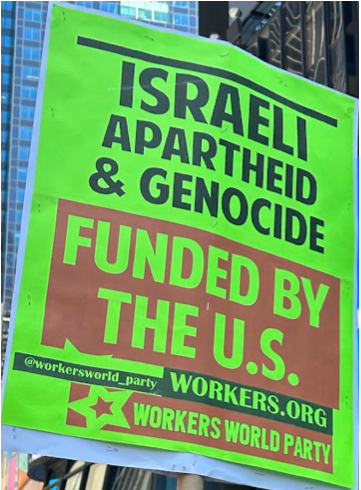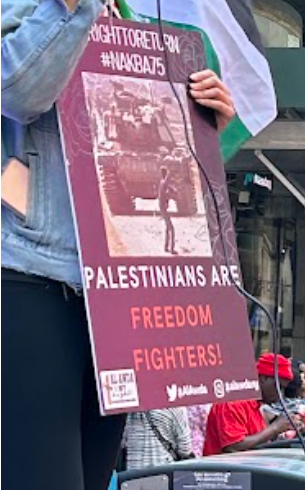75 years without justice
AMP-NJ, taken at a Pro-Palestine rally held in Times Square/New York City, on May 14, 2023 (Photo courtesy of Nazia Shaheed)
Solemn commemorations and protests mark Palestinian Nakba anniversary
May 15 of this year marked the 75th anniversary of the Nakba, or The Catastrophe. That’s 75 years since Palestinians were first forcibly expelled from their land, and they continue to be expelled to this day. This year, the United Nations (UN) commemorated the day with performances, testimonies, and videos at their New York City headquarters, featuring a keynote address by the President of the State of Palestine, Mahmoud Abbas, as well as a statement by the Under-Secretary-General for Political and Peacebuilding Affairs, Rosemary DiCarlo.
Abbas questioned why the more than 1,000 resolutions adopted by UN bodies regarding Palestinians were never implemented and accused Israel of not fulfilling “the prerequisites for its [UN] membership.”
DiCarlo's statement brought the audience’s attention to the “rapid expansion of settlements,” the “evictions, demolitions and seizures of Palestinian-owned property,” and violence perpetrated by both the Israeli Military and settlers occupying Palestinian land.
“Palestinians deserve a life of justice and dignity,” Dicarlo said, “And the realization of their right to self-determination and independence.”
The United States and the United Kingdom did not attend, and the event garnered sharp criticism from Israel. Members of the Neturei Karta, an organization of religious Jews that oppose the state of Israel, were in attendance for the commemoration.
To understand why Palestinian exile still matters in 2023, we have to go back to 1947, the year before Nakba, and tell the tale of two countries, separated by religion and bound by conflict.
Partition Leads to War
First, it’s crucial to establish the historical context. On November 29, 1947, the United Nations General Assembly passed a resolution to partition Palestine into two states: one Arab and the other Jewish. As part of this plan, around 55 percent of the land of historic Palestine was allocated to the Jewish state, and around 42 percent was given to the Arab state. In contrast to this division, Arabs constituted around 67 percent of the population of Palestine, and Jews only owned about seven percent of the private land in Palestine.
Well before the UN established the partition, a new political movement had emerged in Europe in the late 1800s, termed Zionism. Zionism called for establishing a homeland for Jews in Palestine, influenced by notions of nationalism that had spread throughout Europe. As a result, many European Jews migrated to Palestine. Soon after the partition plan was approved, the expulsion of indigenous Palestinians by Zionist militias began and continues today. Between 750,000 and one million Palestinians were expelled between 1947 to 1949.
On April 9, 1948, members of the Irgun and Stern Gang militias carried out atrocities against villagers in Deir Yassin as part of Plan Dalet, which was the systematic forced depopulation of indigenous Palestinians from their land to allow for the formation of a Jewish majority state. Testimonies from Israeli militia fighters are gruesome, to say the least. The commander of the operation, Yehoshua Zettler, described that “House after house...we’re putting in explosives and they are running away...within a few hours, half the village isn’t there anymore.” At least 107 Palestinians were killed.
A British delegation to the United Nations reported that “the deaths of some 250 Arabs, men, women, and children, which occurred during this attack, took place in circumstances of great savagery” and that “women and children were stripped, lined up, photographed, and then slaughtered by automatic firing and survivors have told of even more incredible bestialities.”
Other massacres were perpetrated in villages such as Nasir al-Din, Ayn al-Zaytun, Jish, and al-Saliha. Additionally, the rape of Palestinian women in Safsaf village and al-Dawayima was another war crime perpetrated by the proto-Israeli soldiers.
That infamous day, May 15, 1948, marked the official start of the first Arab-Israel War. The previous night, the head of the Jewish Agency, David Ben-Gurion, proclaimed a new state of Israel as the last British soldiers stationed in Palestine as part of the British Mandatory Rule prepared to leave per the mandate’s expiration on May 14. Palestine was officially on its own, with its citizens being killed or expelled at an alarming rate.
On Nakba, Arab forces entered Palestine to offer support, including troops from Egypt, Iraq, and the Arab Legion of Jordan. Jewish civilians were mobilized as part of the war effort and assisted in village demolitions and agricultural field destructions. The Arab forces were largely unsuccessful as the Israeli soldiers conquered a majority of Palestine. Palestinian villagers who fought back did so with handguns and rifles, which were no match for organized Israeli army units. By 1949, more than 75 percent of Palestinians had been displaced from their homeland.
Aiming the Lens at Decades of Displacement
Even through the late 20th and into the early 21st century, Palestinians continue to face attacks on their lives and properties. Palestinians who were forcibly displaced from their homes, as well as their descendants, have virtually no prospect of being allowed to return. When Israel occupied Palestinian territories in the West Bank and the Gaza Strip in 1967, around 300,000 more Palestinians were displaced, and since that time, thousands of others have been forcibly displaced due to Israel’s illegal settlements, forced evictions, home demolitions, and land-grabbing, not to mention military offensives.
On December 27, 2008, Israel launched a 22-day military attack on Gaza, titled Operation Cast Lead, that consisted of aerial bombing, drone strikes, and land assaults, leading to the deaths of between 1,385 and 1,419 Palestinians. The UN Human Rights Council investigated the possible violations of international law during the conflict and found that the Israeli military had committed war crimes and crimes against humanity.
After the 2014 Gaza War, which killed more than 2,100 Palestinians (a majority of whom were civilians), 67 Israeli soldiers, and 6 Israeli civilians, Israeli military combatants spoke of their parts in the war and testified that “any Palestinians they saw were classified as ‘terrorists,’ and they could ‘shoot any person positively identified as not belonging to the IDF’” and “...if they deserve something it’s either to be badly wounded or killed.”
A 2022 Amnesty International report that defines Israel’s occupation as apartheid notes several examples of such oppression. As a result of this apartheid, UNRWA (United Nations Relief and Works Agency for Palestine Refugees in the Near East) estimates there to be around 5.9 million Palestinian refugees who are eligible for their services, which include education, social safety nets, microfinance loans, and infrastructure improvement. Palestinians are, at present, confined to separate, densely populated enclaves, denied equal citizenship rights, face restrictions on movement and family unification, lack adequate essential services such as clean water and sanitation, and have fewer opportunities for work, education, and accessing healthcare.
What Can Be Done?
It is imperative that we recognize these basic facts and show our solidarity. An apartheid state has fallen in the past, so it is possible. For now, Palestinians need the international community to take action: boycott, divest from Israel, and place sanctions on the apartheid state. American Muslims for Palestine (AMP) plays a key role by hosting teach-ins to educate the community on the history of the Palestinian struggle, participating in protests and rallies, and lobbying members of Congress to advocate for changes to American policies.
On May 14, the New Jersey Chapter of American Muslims for Palestine (AMP-NJ) joined other organizations protesting in Times Square in New York City and calling for a free Palestine. Additionally, AMP-NJ is a national leader in AMP’s Date Boycott Campaign. This boycott, which launches before and runs through Ramadan, calls on individuals and businesses to boycott Israeli dates, especially the Muslim community, which purchases dates to break their fasts.
History tells us we can fight loudly and proudly for the rights of a free Palestine, and if that means protests and date boycotts, then that is the least we can do until we can do more. The UN has proven that it will continue to be the bearer of mixed messages about the Palestinian condition. Notwithstanding, the collective experiences of Palestinians and the Nakba cannot be denied. To do so would be antithetical to the notions of justice by which we claim to live.
To learn more about Nakba and American Muslims for Palestine's work to promote a free Palestine, visit their website at www.ampalestine.org.



